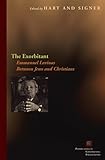The Exorbitant : Emmanuel Levinas Between Jews and Christians / ed. by Michael A. Singer, Kevin Hart.
Material type: TextSeries: Perspectives in Continental PhilosophyPublisher: New York, NY : Fordham University Press, [2022]Copyright date: ©2010Description: 1 online resource (304 p.)Content type:
TextSeries: Perspectives in Continental PhilosophyPublisher: New York, NY : Fordham University Press, [2022]Copyright date: ©2010Description: 1 online resource (304 p.)Content type: - 9780823230167
- 9780823292929
- online - DeGruyter
| Item type | Current library | Call number | URL | Status | Notes | Barcode | |
|---|---|---|---|---|---|---|---|
 eBook
eBook
|
Biblioteca "Angelicum" Pont. Univ. S.Tommaso d'Aquino Nuvola online | online - DeGruyter (Browse shelf(Opens below)) | Online access | Not for loan (Accesso limitato) | Accesso per gli utenti autorizzati / Access for authorized users | (dgr)9780823292929 |
Frontmatter -- Contents -- Acknowledgments -- Introduction: Levinas the Exorbitant -- Levinas Between German Metaphysics and Christian Theology -- The Disincarnation of the Word -- Secrecy, Modesty, and the Feminine Kabbalistic Traces in the Thought of Levinas -- Against Theology, or ‘‘The Devotion of a Theology Without Theodicy’’ -- Is the Other My Neighbor? -- ‘‘Love Strong as Death’’ -- On Levinas’s Gifts to Christian Theology -- The Prevenience and Phenomenality of Grace; or, The Anteriority of the Posterior -- Profligacy, Parsimony, and the Ethics of Expenditure in the Philosophy of Levinas -- Excess and Desire -- The Care of the Other and Substitution -- Should Jews and Christians Fear the Gifts of the Greeks? -- Thinking about God and God-Talk with Levinas -- Words of Peace and Truth -- Notes -- Contributors -- Index -- Perspectives in Continental Philosophy Series
restricted access online access with authorization star
http://purl.org/coar/access_right/c_16ec
We are exorbitant, and rightly so, when we cut any link we may have to cosmological powers. Levinas invites us to be exorbitant by distancing ourselves from visions of metaphysics, epistemology, and theology. We begin to listen well to Levinas when we hear him inviting us to break completely with the pagan world in which the gods are simply the highest beings in the cosmos and learn to practice an adult religion in which God is outside cosmology and ontology. God comes to mind neither in our attempts to think him as the creator of the cosmos nor in moments of ecstasy but in acts of genuine holiness, such as sharing a piece of bread with someone in a time of desperate need. Levinas, in short, enjoins us to be exorbitant in our dealings with one another. This book asks how the "between" of Levinas's thinking facilitates a dialogue between Jews and Christians. In one sense, Levinas stands exactly between Jews and Christians: ethics, as he conceives it, is a space in which religious traditions can meet. At the same time, his position seems profoundly ambivalent. No one can read a page of his writings without hearing a Jewish voice as well a a philosophical one. Yet his talk of substitution seems to resonate with Christological themes. On occasion, Levinas himself sharply distinguishes Judaism from Christianity--but to what extent can his thinking become the basis for a dialogue between Christians and Jews? This book, with a stellar cast of contributors, explores these questions, thereby providing a snapshot of the current state of Jewish-Christian dialogue.
Mode of access: Internet via World Wide Web.
In English.
Description based on online resource; title from PDF title page (publisher's Web site, viewed 03. Jan 2023)


